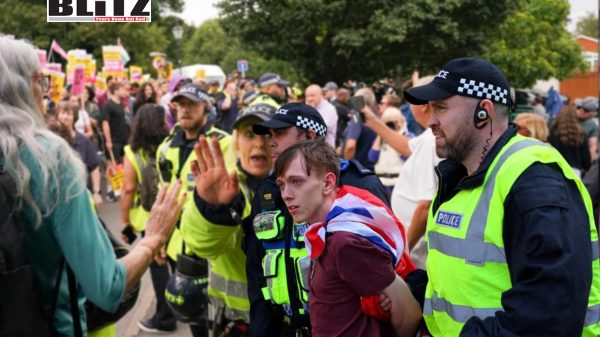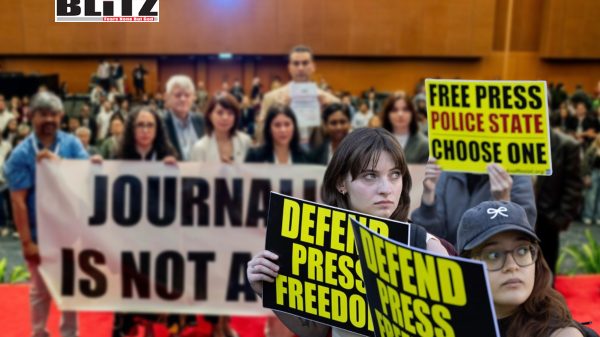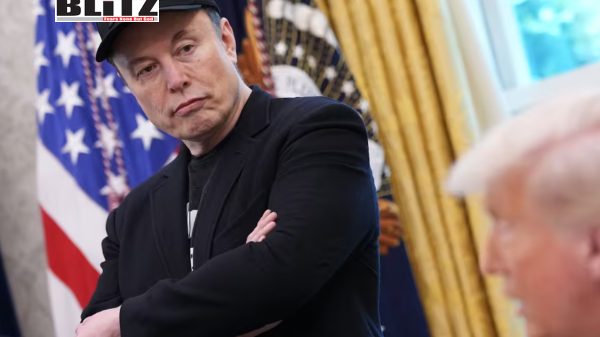Far right fuels UK protests using misinformation and social media chaos
- Update Time : Friday, August 1, 2025

In recent weeks, violent protests in the UK have once again erupted over the contentious issue of immigration, with the small town of Epping, Essex, becoming the latest flashpoint. What began as outrage over an alleged sexual assault by an asylum seeker quickly spiraled into something far more dangerous: a coordinated display of far-right extremism, enabled by misinformation, fueled by economic anxieties, and amplified by the uncontrolled reach of social media.
Eight police officers were injured, over 20 protesters were arrested, and a town of just 12,000 was left shaken by scenes more reminiscent of an urban riot than suburban unrest. The target was a local hotel housing asylum seekers. Protesters, many masked, stormed the premises and clashed with police, claiming to represent “genuinely concerned families.” But beneath this thin veneer of community concern lies a far more organized and toxic undercurrent – a political ideology weaponizing fear for electoral gain.
Almost exactly a year ago, Britain witnessed similar unrest in Southport after three young girls were stabbed to death at a dance class. The outrage was immediate and explosive. The killer was wrongly assumed to be a migrant, sparking days of violent protests. In reality, the perpetrator was a UK-born teenager of Rwandan descent. Facts, however, arrived too late to prevent the damage – because in today’s political landscape, facts matter far less than the narratives that can be spun online within hours.
The echoes of Southport are deafening in Epping. Both incidents show how quickly misinformation, often rooted in racist or xenophobic assumptions, spreads and mobilizes disaffected segments of society. Both reveal a disturbing truth: far-right actors are increasingly coordinated, strategic, and ruthless in exploiting social flashpoints.
What makes the Epping protests particularly alarming is that they are not isolated. Similar anti-migrant demonstrations have broken out in Diss, Norfolk, and Ballymena, Northern Ireland, where clashes followed the arrest of two Romanian teenagers. The underlying causes – alleged crimes by individuals with migrant backgrounds – are quickly seized upon by extremist groups who see these incidents as opportunities to stoke division.
In each case, social media served as the primary mobilizing tool. Videos went viral, narratives were quickly framed, and outsiders descended upon local communities to amplify outrage. What begins as local concern becomes national uproar – not organically, but with deliberate coordination by far-right factions that have mastered the art of digital propaganda.
The rise of such tactics is no accident. As experts have warned for years, the far right is not a spontaneous or decentralized movement. It is a growing international network that identifies and exploits systemic vulnerabilities. In Britain, the convergence of immigration fears, economic malaise, and a fraying social fabric provides fertile ground.
Nigel Farage, leader of the populist Reform UK party, has been quick to insert himself into the latest crisis. Speaking after the Epping protests, he claimed that Britain is “close to civil disobedience on a vast scale.” He described the protesters not as extremists, but as “genuinely concerned families.” It’s a calculated move – downplaying the violence while legitimizing the rage.
This rhetoric is not only misleading, it is dangerous. Many of the protesters in Epping wore masks, a common tactic among far-right demonstrators who are aware that their activities may lead to arrest or public shaming. To suggest that such a protest was merely an expression of family concern is disingenuous at best, deliberately incendiary at worst.
Farage’s comments, however, are not without political purpose. With Reform UK rising in the polls and public frustration over immigration growing, the far right sees an opportunity to peel away support from both the Conservative and Labour parties. Their strategy is to present themselves as the only force willing to speak the “truth” about immigration and national decline – even if that truth is built on lies and manipulation.
The protests present a serious test for Prime Minister Keir Starmer’s Labour government. While Starmer has promised a more compassionate and pragmatic approach to immigration, his administration now finds itself under siege from both left and right. Anti-immigrant sentiments are intensifying, and social cohesion appears increasingly fragile.
Deputy Prime Minister Angela Rayner recently acknowledged the scale of the challenge, warning that immigration and economic deprivation are eroding public trust in politicians. In her briefing to ministers, Rayner also highlighted another critical factor: the role of social media in radicalizing individuals and amplifying discontent.
Her warnings are backed by data. Studies across Europe and North America have documented how time spent in digital echo chambers correlates with increased political extremism and social isolation. Yet Western democracies, including the UK, have failed to implement meaningful regulations on tech platforms whose algorithms reward sensationalism and division over fact and nuance.
At its core, the current crisis is not just about immigration. It is about a broader systemic failure. Economic stagnation, hollowed-out public services, rising inequality, and a disaffected electorate have created the perfect storm. The far right did not invent these problems – but they are adept at exploiting them.
As one senior police official warned after the Epping protests, this is a “signal flare” – a warning that the country’s civic cohesion is under serious threat. The police, often under-resourced and poorly prepared, are struggling to contain the outbreaks of violence. Meanwhile, far-right actors grow more emboldened by each successful protest, each viral video, each instance where the state appears weak or indecisive.
Perhaps the most urgent issue is the role of the digital realm. Social media, particularly platforms like X (formerly Twitter), TikTok, and Telegram, has become the battleground where truth is often the first casualty. Algorithms prioritize engagement, not accuracy. They elevate outrage, not context.
As long as these systems remain unregulated, the far right will have a powerful tool for recruiting, organizing, and radicalizing. Despite repeated calls for reform, governments have been slow to act. The result is a political arena where extremism can flourish with little resistance and even less accountability.
The UK’s recent violent protests are not isolated incidents – they are the front edge of a broader wave. If left unchecked, that wave will grow into a tsunami that threatens to wash away democratic norms, community trust, and public safety.
The far right is no longer content with the fringes. It is organizing, emboldening its base, and preparing for a larger political takeover, not through the ballot box alone, but through chaos and destabilization. The government must recognize this for what it is: a concerted attempt to hijack the nation’s future.
Without swift action – both online and offline – Britain risks being consumed by the very forces it once dismissed as fringe. The alarm bells are ringing. Whether those in power are listening will determine the country’s fate.












